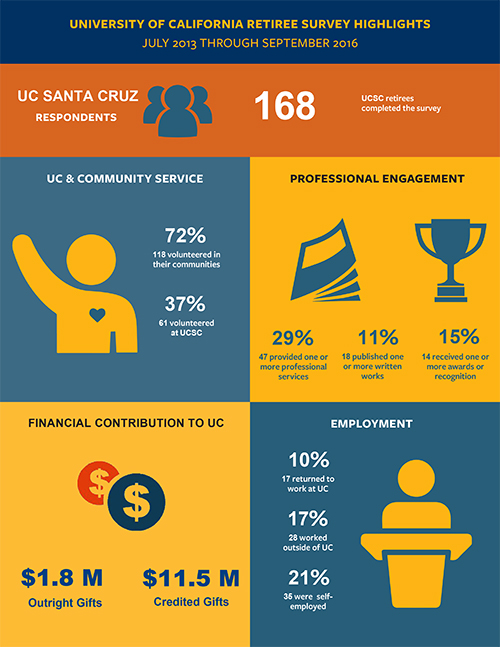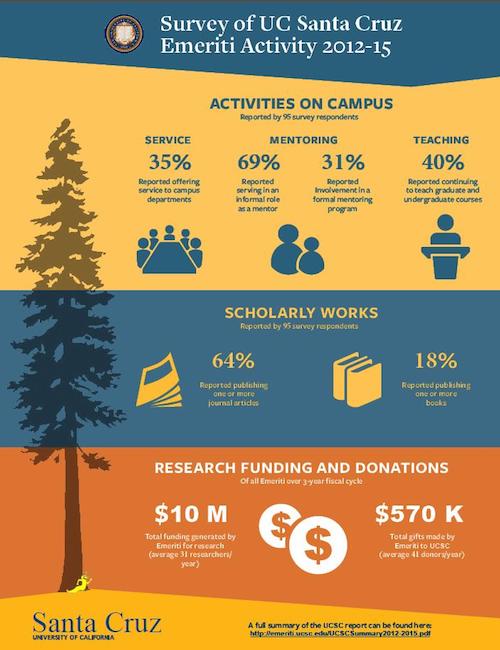Campus News
UC’s secret energy source: retirees
For University of California staff and faculty, retirement does not mean retreat


A new report finds University of California retirees carry on academic activities, volunteer on their campuses and in their communities, and provide generous donations. UC Santa Cruz retirees appear especially active.
Drawing on a survey of 4,478 retirees, the report, UC Retirees: Advocates, Ambassadors, Assets, finds former UC employees have continued productive and engaged lifestyles. It quotes one respondent who said retirees “retired from working but not from living.”
UC Santa Cruz Retiree Association member Lee Duffus exemplifies active former staff, volunteering both for the UC Santa Cruz Retirees Association and for off-campus groups. The former Associate Vice Chancellor of Student Services led the committee that created the survey for the statewide Council of UC Retiree Associations.
The survey found particularly high volunteerism at UC Santa Cruz, which Duffus attributed to the loyalty former staff feel.
“A lot of us have devoted our careers to the institution,” he said.
Parking seems to be a factor for retirees’ on-campus activities. UC Santa Cruz affords free parking permits to its retirees. Parking restrictions were an obstacle to involvement in other campuses.
Duffus said his committee created the report to complement a survey of emeriti faculty that shows retired professors continue teaching and conducting research.
Not much changes
Emeritus chemistry professor Todd Wipke said that for many of his fellow faculty, retirement isn’t a cessation of work, but a change in the relationship with the campus. Wipke has carried on his own research, serves as president of the local emeriti association, and for several years after he retired he sponsored research by graduate or undergraduate students.
“My wife said ‘not much changes,’” he said. “I was in my office every day.”
The biggest difference for Wipke was that he stopped teaching classes. He said one colleague still leads classes 20 years into retirement and another has published 50 papers since he retired.
“Nobody is being paid to do this,” he noted. “The motivating force here is the person themselves and what they enjoy.”
A virtual 11th UC campus
Statewide the collective ongoing work of emeriti faculty produces an equivalent amount equivalent of research to a whole separate research university. Wipke noted that a 2016 report by the Council of University of California Emeriti Association was titled “A Virtual Eleventh Campus.”
Retirees represent a significant source of financial donations, pledging more than $11 million in planned gifts and contributing $1.8 million to UC Santa Cruz programs from 2013 to 2016.
About one in eight retirees reported doing some part-time work for their former campuses. While drawing a pension, retirees are limited to 43 percent time and may only be appointed a year at a time. The survey suggests taking advantage of the skills and experience of retirees could save money and time for the UC system.
University retirees also contribute to their communities as volunteers in cultural and educational organizations. Statewide, 63 percent reported performing volunteer work in their communities, a rate more than twice as high as is typical for retirement-aged populations.
Rich and full of opportunities
Like many survey respondents, Duffus also gives time to off-campus organizations. He serves on the board of the Cabrillo College Foundation and volunteers to help bring Santa Cruz Symphony and Santa Cruz Shakespeare programs to nearby schools. His community volunteering is driven by the gratifying feeling that his efforts extend the reach of these groups.
Duffus said he actually struggles with the word “retirement,” calling his post-career experience “rich” and “full of opportunities.”
“Our language hasn’t come up with anything better,” he said. “Retirees don’t just shut down and sit on top of their pensions. They’re active people.”